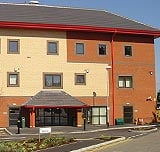

Mr Maulik Gandhi
Mr Maulik Gandhi is a Consultant Orthopaedic Consultant in Brimingham and Yorkshire who specialises in Shoulder and Elbow Surgery
View ProfileShoulder pain is a common problem that can affect people of all ages. It can be caused by a variety of factors, from a simple muscle strain to a more serious underlying medical condition. Understanding the cause of your shoulder pain is the first step towards finding the right treatment and getting back to your daily activities without discomfort.
This article will explore the common causes of shoulder pain, how it can be treated, and when you should seek medical advice. We will also answer some frequently asked questions about shoulder pain.
The shoulder is the most mobile joint in the body, allowing you to lift, rotate, and extend your arms in multiple directions. It is a complex ball-and-socket joint, where the head of the upper arm bone (humerus) fits into a shallow socket (glenoid) in the shoulder blade (scapula). This joint is surrounded by a group of muscles and tendons called the rotator cuff, which keeps the head of the humerus in the socket and allows you to move your arm.
The shoulder's incredible range of motion, however, comes at the cost of stability, making it prone to injury. Problems with any part of the shoulder, including the bones, muscles, tendons, ligaments, and cartilage, can cause pain.
Shoulder pain can be caused by a number of conditions, including:
Pain that is felt in both the shoulder and neck is often due to a problem in the neck itself. This is known as referred pain. The nerves that supply the shoulder originate in the neck, and if these nerves are irritated or compressed, it can cause pain that radiates down into the shoulder and arm. This can be caused by conditions such as a herniated disc or cervical spondylosis (age-related wear and tear of the neck).
If you are experiencing both shoulder and neck pain, it is important to see a doctor to determine the underlying cause.
Shoulder pain that is worse at night is a common complaint. This can be due to a number of factors:
Sudden shoulder pain that occurs without any apparent injury can be alarming. Possible causes include:
If you are experiencing shoulder pain and are unsure of the cause, it is always best to err on the side of caution and seek medical advice.
In some cases, shoulder pain can be a sign of a heart attack. It is important to be able to distinguish between muscular shoulder pain and pain that may be heart-related.
Muscular shoulder pain:
Is usually a dull, aching pain that is localized to the shoulder area.
Is often made worse by movement.
May be accompanied by weakness or stiffness in the shoulder.
Usually improves with rest and over-the-counter painkillers.
Heart-related shoulder pain:
Is often described as a feeling of pressure, tightness, or squeezing in the chest that spreads to the shoulder, arm, neck, jaw, or back.
May be accompanied by other symptoms such as shortness of breath, sweating, nausea, or light-headedness.
Is not usually affected by movement.
Is a medical emergency and requires immediate attention.
If you are experiencing shoulder pain and are unsure of the cause, it is always best to err on the side of caution and seek medical advice.
The treatment for shoulder pain will depend on the underlying cause. In many cases, simple self-care measures can be effective. For more information visit our pain management page.
Gentle exercises can help to reduce stiffness and improve the range of motion in your shoulder. A physiotherapist can develop a personalised exercise program for you, as well as provide other treatments such as manual therapy and advice on how to modify your activities to avoid further injury.
Over-the-counter painkillers such as paracetamol and ibuprofen can help to relieve mild to moderate shoulder pain. If your pain is more severe, your doctor may prescribe stronger painkillers.
Steroid injections can be used to reduce inflammation and relieve pain in the shoulder. They are often used to treat conditions such as rotator cuff problems and frozen shoulder.
In some cases, surgery may be necessary to treat shoulder pain. This may be recommended if other treatments have not been effective, or if there is a structural problem with the shoulder that needs to be repaired.
Common surgical procedures for the shoulder include:
You should see a doctor if:
You should call for an ambulance or go to the nearest emergency department if you have shoulder pain that is accompanied by chest pain, shortness of breath, or other signs of a heart attack.
Shoulder pain is very common and understanding the cause of your shoulder pain is the first step towards finding the right treatment and getting back to your daily activities without discomfort.
Ramsay Health Care offers expert diagnosis and treatment for shoulder pain, including fast access to consultations and surgery if required. Contact us today to book an appointment today with a shoulder pain specialist.
The best way to treat shoulder pain depends on the cause. For many people, a combination of rest, ice, and over-the-counter painkillers is effective. A physiotherapist can also help by providing exercises and other treatments.
You should see a doctor if your shoulder pain is severe, you are unable to move your arm, your shoulder is swollen or an abnormal shape, or you have a fever. If you have shoulder pain with chest pain or shortness of breath, you should seek emergency medical attention.
Sudden shoulder pain that occurs without an injury can be caused by conditions such as a frozen shoulder, calcific tendonitis, or an infection. It is important to see a doctor to determine the cause of your pain.
Pain when you lift your arm is a common symptom of a rotator cuff problem. This can be due to inflammation of the tendons (tendonitis) or a tear in one of the tendons.
In many cases, mild shoulder pain will get better on its own with rest and self-care. However, if your pain is severe or does not improve after a few weeks, you should see a doctor.
Shoulder pain can be a symptom of several illnesses, including arthritis, heart disease, and problems with the neck. It is important to see a doctor to get an accurate diagnosis.

Mr Maulik Gandhi is a Consultant Orthopaedic Consultant in Brimingham and Yorkshire who specialises in Shoulder and Elbow Surgery
View Profile














West Midlands Hospital was delighted to welcome Alex Ballinger, MP for Halesowen, for a return visit to the hospital. As the only hospital in the Halesowen constituency, West Midlands plays a vital role in supporting both the NHS and the local community by meeting local healthcare needs.
Ramsay Health Care UK is delighted to announce that all 25 hospitals providing endoscopy services have achieved the Joint Advisory Group (JAG) accreditation, and are the only independent provider to attain this.
Mayor of Boston Borough, Barrie Pierpoint, opens new state-of-the-art theatre and unveils refurbishment of reception and additional consulting room and recovery area at Boston West Hospital, Part of Ramsay Health Care UK.
The information, including but not limited to, text, graphics, images and other material, contained on this website is for educational purposes only and not intended to be a substitute for medical advice, diagnosis or treatment. Always seek the advice of your physician or other qualified health care provider with any questions you may have regarding a medical condition or treatment.
No warranty or guarantee is made that the information contained on this website is complete or accurate in every respect. The testimonials, statements, and opinions presented on our website are applicable to the individuals depicted. Results will vary and may not be representative of the experience of others. Prior patient results are only provided as examples of what may be achievable. Individual results will vary and no guarantee is stated or implied by any photo use or any statement on this website.
Ramsay is a trusted provider of plastic or reconstructive surgery treatments as a part of our wrap-around holistic patient care. Our personal, friendly and professional team are here to support you throughout to ensure the best possible care. All procedures we perform are clinically justified.
*Acceptance is subject to status. Terms and conditions apply. Ramsay Health Care UK Operations Limited is authorised and regulated by the Financial Conduct authority under FRN 702886. Ramsay Healthcare UK Operations is acting as a credit broker to Chrysalis Finance Limited.
Ramsay Health Care UK is not currently recruiting for any roles based outside of England. If you are interested in applying for a role with Ramsay Health Care UK, please note that all available positions are advertised exclusively on our official website: https://www.ramsayhealth.co.uk/careers. Be cautious of individuals or organisations that approach you directly for remotely-based roles. Always verify the authenticity of the job offer and be careful with whom you share your personal information. For more information and advice on employment fraud, please visit: https://www.ramsayhealth.co.uk/careers/recruitment-fraud